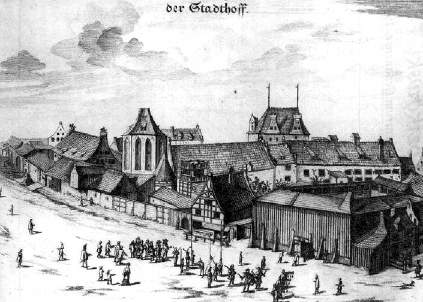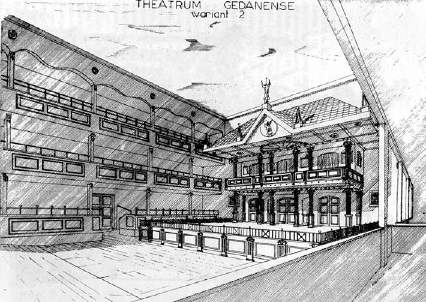2. Shakespeare's Arrival In Poland: Humble Beginnings
Shakespeare in Poland -- page 3 | next
Shakespeare began his theatrical career in Poland at the beginning of the seventeenth century. In his monograph "Gentlemen of a Company": English Players in Central and Eastern Europe 1590-1660, Jerzy Limon maintains that the strolling London players mainly frequented Gdańsk (Danzig), Elbląg (Elbing) and Królewiec (Kronigsburg now Kaliningrad). It is possible that their first visit in Gdańsk took place as early as 1601. Records indicate that two years later a troupe led by the English actor John Green was in Gdańsk and Elbląg, while in 1609 and in 1611-1612 John Spencer's company visited Gdańsk and Królewiec. In 1615 two companies, headed respectively by Robert Archer and John Green, staged their plays in Gdańsk. The latter troupes re-appeared in Poland the following year in Elbląg, Królewiec and the royal court in Warsaw. In 1619 Gdańsk attracted the interest of three English companies: a kind of "Englische Comediantien." The last documented English players' visits in Gdańsk were by a company led by Spencer, and by a company conducted by Green and Robert Brown (Limon, 1985: 28-63).
The choice of places was not incidental, since an English-speaking community populated these northern Poland towns. At that time Poland--one of the largest European Empires--attracted the political and commercial interest of the rapidly expanding little island across the English Channel. Further, the Polish coast offered refuge for Scotsmen, who, escaping religious persecution, made their home in Poland, one of the few European countries where, even during the most severe fanaticism, wood was not ignited at the bases of stakes (Zins, 1974: 80-115). [Note 5] Shakespeare's art must have taken the Gdańsk public by storm. Around 1610 the popularity of these plays made the Gdańsk burgers invest in a permanent theatre, a replica of "the Fortune."
Peter Willer, Der Stadhof, 1664-1686, the building of Fencing School in Gdansk where the sixteenth century theatre productions took place. Click on the image to see a larger version.
It was one of the first stationary public theatres built in Central Europe (Limon, 1989: 148). Prince Charles of Britain is currently the Honorary Chairman of the Theatrum Gedanense Foundation, initiated and chaired by Professor Jerzy Limon to raise funds for the rebuilding of this theatre. (For the Theatrum Gedanense Foundation activities, see Section: "Theatrical Renditions of Shakespeare in Democratic Poland".) [Note 6]
One of the models for the modern reconstruction of the sixteenth century Gdansk theatre. Click on the image to see a larger version.
Starting from 1616, the English performers staged their plays at the Warsaw royal court. The 1616 and 1617 visits of a troupe led by John Green are of a special significance, since only in the case of this company are there available documents to prove that their repertory included Shakespeare's plays, which were German prose adaptations (Hahn, 1958: 142). Green was a leader of English professional actors who toured Germany and Poland between 1607 and 1627. Fascinated with the English theatre, the king, Vladislaus IV Vasa (1595-1648), contracted the troupe of Richard Jones, whose players performed in Warsaw and other Polish towns in 1626-1632. On the basis of Robert Archer's supplication, in which one can find references to his company's employment at the court of king Johann Sigismund III, Limon approximates that that employment covered 1626-1632. In 1622 the troupe of Aaron Asken received royal patronage and the players remained in Warsaw until 1641. His actors performed Hamlet, A Midsummer Night's Dream, Much Ado About Nothing, The Taming of the Shrew, and The Merry Wives of Windsor (Calina, 1946: 15). According to Limon, Robert Reynolds, a popular English comedian known as "Pickleherring," died in Warsaw around 1642. King Vladislavus IV granted his wife a pension, which was "perhaps the first known example of an actor's pension scheme in Poland" (2001: 149).
The non-English-speaking Polish public must have been attracted to the histrionics of the stagings of Shakespeare's plays, though until 1620 these performances were in English. In 1620 the first German renditions of his dramas appeared in Poland. Some critics state that the initial Polish attempts at dramatic art were inspired by the exposure to the repertory of the English travelling performers. The first full-fledged drama, Z chłopa król (A Peasant Turned into King, 1633) by Piotr Baryka, is generally regarded as inspired by the structure and some content elements of The Taming of the Shrew. External evidence demonstrates that the play was written in 1628-1629, while its first staging took place in the last day of the 1633 carnival (Chemperek, 2003: 5-34).
Notes
[5] Professor Witold Ostrowski writes in his study Anglo-Polish Relations that "as early as 1423 about 55 English people lived in Gdansk. 'Angielska grobla' ('The English Dyke'), one of Gdansk landmarks, comes from these times . . . The Eastland Company began to function in Gdansk in 1599 and in Elblag in 1583." I would like to thank Professor Ostrowski for sharing with me his work in manuscript. [Back]
[6] It is worth quoting in this context Zdenek Stribrny who points out that when Limon's project is accomplished "there will be theatres in Slavonic Europe in which Shakespeare's plays can be staged in conditions similar to those in his times." In 1999 a reconstruction of the Globe was opened in an amusement park in Prague. Romeo and Juliet inaugurated the Prague Globe activities (2000: 10). [Back]


